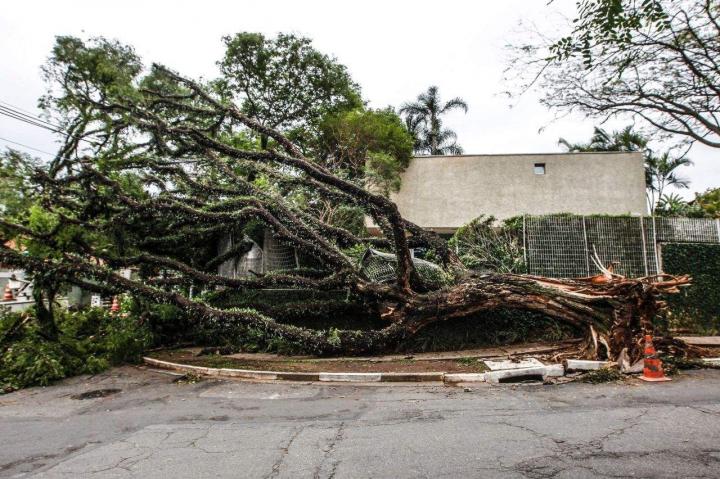Cities located in metropolitan areas of this Brazilian state score better according to an index that measures the existence of public policies designed to adjust critical sectors to the impacts of climate change
Most cities in São Paulo state (Brazil) have low potential capacity to adapt to climate change in terms of the ability to formulate public policy that facilitates the revamping of their housing and transportation systems, for example, to account for the impact of climate change.
This is the main conclusion of a study conducted by researchers at the University of São Paulo (USP) in partnership with colleagues at the University of Campinas (UNICAMP) and the Federal University of Itajubá (UNIFEI) in Brazil, and the University of Michigan in the United States.
Researchers linked to a project supported by FAPESP participated in the study. The results are published in the journal Climatic Change.
Key findings were presented on May 19 to the 9th Brazilian-German Dialogue on Science, Research and Innovation, entitled “Cities and climate, the multilevel governance challenge”.
The event, organized by FAPESP in partnership with the German Center for Science and Innovation (DWIH) in São Paulo, was held online on May 17-20.
“We found that most cities in São Paulo state still have a lot of difficulties aligning public policy that can be connected to adaptation to climate change,” said Gabriela Marques Di Giulio, last author of the study and a professor at the University of São Paulo’s School of Public Health (FSP-USP).
To help cities assess their capacity to cope with the impact of climate change by implementing policies combining sustainability and adaptation in the short and long term, the researchers developed an Urban Adaptation Index (UAI) that measures the effectiveness of public policy and legislation or regulation in supporting urban intervention relating to climate change in several areas, such as housing, mobility, agriculture and environment.
“The indicators for the UAI can be based on public data, such as the census carried out by IBGE [Brazil’s national statistics bureau], so the index is easily accessible and can be dynamically updated to reflect changes occurring in cities,” Di Giulio said.
The researchers used the index to evaluate São Paulo state’s 645 municipalities. The results pointed to low scores for over half in the five dimensions evaluated.
Cities located in metropolitan areas, where more than 50% of the state’s population live, had the highest scores. “The UAI can help strengthen cities’ capacity to adapt and provoke a more knowledgeable debate about how they should best prepare for climate change,” Di Giulio said.
The role of cities
Cities should establish strategies to reduce greenhouse gas emissions, achieve climate neutrality, and contribute to global efforts to mitigate the effects of climate change, said Sabine Schlacke, a professor at the University of Münster (WWU) in Germany.
Because they are part of nation-states, cities do not have foreign policy powers and their capacity to act according to the international climate change mitigation agenda is limited, but they can organize cooperation with other cities in networks like C40. “Cities are not addressed directly by the Paris Agreement, for example. Nevertheless, they can be involved in the development of nationally determined contributions, the NDCs that have to be submitted by member states,” Schlacke said.
According to Cathrin Zengerling, a professor at the University of Freiburg, few cities in the world are close to achieving the greenhouse gas emission targets required to keep the global average temperature rise well below 2 °C and limit it to 1.5 °C above the preindustrial level, as established by the Paris Agreement.
One is São Paulo. “Among the reasons São Paulo has done so well in this regard is that most of its electricity comes from hydropower,” Zengerling said.
The cities that most emit greenhouse gases are Denver, Chicago and Los Angeles in the US, and Shanghai and Beijing in China, she added.
The event website, with links to full recordings of all four days, is at: fapesp.br/eventos/dwhi9.
###
About São Paulo Research Foundation (FAPESP)
The São Paulo Research Foundation (FAPESP) is a public institution with the mission of supporting scientific research in all fields of knowledge by awarding scholarships, fellowships and grants to investigators linked with higher education and research institutions in the State of São Paulo, Brazil. FAPESP is aware that the very best research can only be done by working with the best researchers internationally. Therefore, it has established partnerships with funding agencies, higher education, private companies, and research organizations in other countries known for the quality of their research and has been encouraging scientists funded by its grants to further develop their international collaboration. You can learn more about FAPESP at http://www.
Media Contact
heloisa reinert
[email protected]
Original Source
https:/
Related Journal Article
http://dx.





